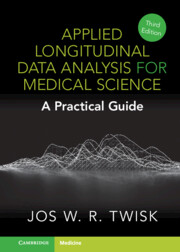Book contents
- Applied Longitudinal Data Analysis for Medical Science
- Applied Longitudinal Data Analysis for Medical Science
- Copyright page
- Dedication
- Content
- Preface
- Acknowledgements
- Chapter 1 Introduction
- Chapter 2 Continuous Outcome Variables
- Chapter 3 Continuous Outcome Variables: Regression-based Methods
- Chapter 4 The Modelling of Time
- Chapter 5 Models to Disentangle the Between- and Within-subjects Relationship
- Chapter 6 Causality in Observational Longitudinal Studies
- Chapter 7 Dichotomous Outcome Variables
- Chapter 8 Categorical and Count Outcome Variables
- Chapter 9 Outcome Variables with Floor or Ceiling Effects
- Chapter 10 Analysis of Longitudinal Intervention Studies
- Chapter 11 Missing Data in Longitudinal Studies
- Chapter 12 Sample Size Calculations
- Chapter 13 Software for Longitudinal Data Analysis
- References
- Index
Chapter 6 - Causality in Observational Longitudinal Studies
Published online by Cambridge University Press: 20 April 2023
- Applied Longitudinal Data Analysis for Medical Science
- Applied Longitudinal Data Analysis for Medical Science
- Copyright page
- Dedication
- Content
- Preface
- Acknowledgements
- Chapter 1 Introduction
- Chapter 2 Continuous Outcome Variables
- Chapter 3 Continuous Outcome Variables: Regression-based Methods
- Chapter 4 The Modelling of Time
- Chapter 5 Models to Disentangle the Between- and Within-subjects Relationship
- Chapter 6 Causality in Observational Longitudinal Studies
- Chapter 7 Dichotomous Outcome Variables
- Chapter 8 Categorical and Count Outcome Variables
- Chapter 9 Outcome Variables with Floor or Ceiling Effects
- Chapter 10 Analysis of Longitudinal Intervention Studies
- Chapter 11 Missing Data in Longitudinal Studies
- Chapter 12 Sample Size Calculations
- Chapter 13 Software for Longitudinal Data Analysis
- References
- Index
Summary
It is often assumed that one of the main features of a longitudinal study is the fact that causality can be detected. This is, however, only partly true for observational longitudinal studies. In Chapter 6, several methods are discussed, which claim to detect causal relationships. In a time-lag model, the covariate measured at a certain time-point is related to the outcome measured one time-point further. Because of the temporality between the outcome and the covariate, the observed relationship is assumed to be causal. A relatively new method to detect causal relationships in longitudinal studies is longitudinal mediation analysis. In this chapter, several longitudinal mediation models are discussed. In the last part of this chapter, some (more) sophisticated methods that claim to estimate causal relationships (i.e. G-methods and joint models) are examined. All methods are accompanied by extensive real-life data examples.
Information
- Type
- Chapter
- Information
- Applied Longitudinal Data Analysis for Medical ScienceA Practical Guide, pp. 92 - 115Publisher: Cambridge University PressPrint publication year: 2023
